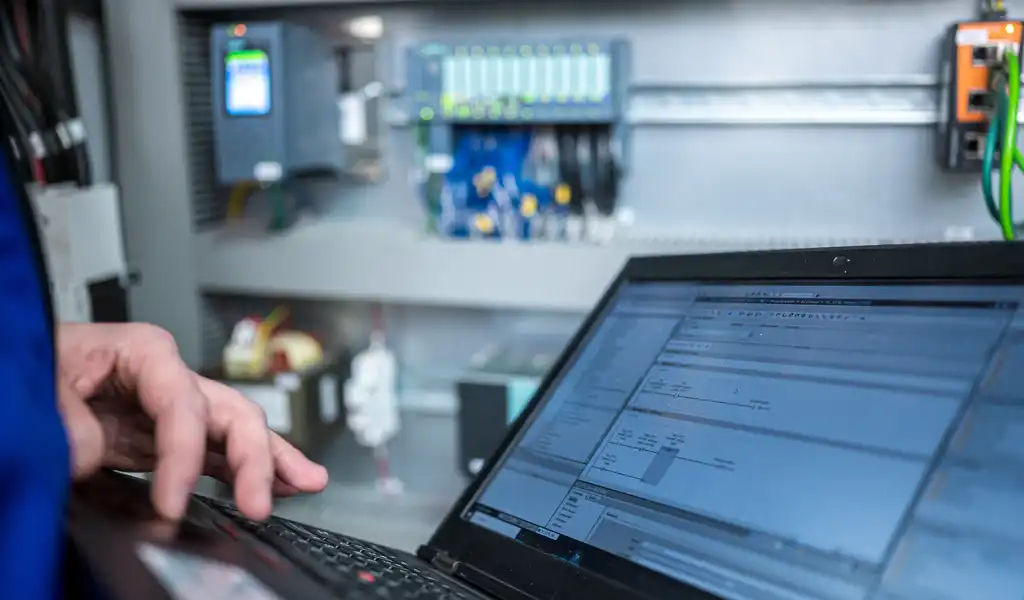What is Industrial Control?
Industrial control is a set of systems and technologies designed to monitor, control, and automate industrial processes. These systems enable companies to improve efficiency, reduce costs, and ensure high safety standards in critical operations.
The concept encompasses advanced tools such as SCADA (Supervisory Control and Data Acquisition) systems, PLCs (Programmable Logic Controllers), and industrial sensors that collect real-time data. This data is processed to make quick and precise decisions that optimize machinery and equipment operations.
Additionally, industrial control is a key component in Industry 4.0, where smart factories require advanced technologies to operate autonomously and connected.

Industrial Control Market Figures
The industrial control sector is constantly growing due to digitalization and the adoption of advanced technologies across all industries. Here are some relevant figures:
-
Global Market Size: According to a report by MarketsandMarkets, the industrial control systems market will reach $215.6 billion by 2026, growing at a compound annual growth rate (CAGR) of 5.6%.
-
Adoption in Key Sectors: The automotive industry accounts for more than 20% of the market, followed by the pharmaceutical and energy industries.
-
Investment in Automation: More than 60% of manufacturing companies have active plans to implement or expand industrial control systems in the next three years.
-
Impact on Productivity: Studies show that companies implementing industrial control report an average 30% increase in productivity.
-
Technological Advances: The use of IoT (Internet of Things) in industrial control is growing rapidly, with annual adoption exceeding 15% in advanced sectors.
These figures reflect how industrial control is not only an operational necessity but also a strategic investment for companies seeking to stay competitive.
Key Technologies in Industrial Control
SCADA (Supervisory Control and Data Acquisition)
SCADA is a technology that allows monitoring and controlling industrial processes from a centralized location. This system collects data from sensors distributed throughout the plant and presents it on intuitive graphs or control panels.
PLCs (Programmable Logic Controllers)
PLCs are programmable industrial computers that execute specific instructions to control machines or processes. They are essential in automated production lines and high-precision environments.
Industrial Sensors
Industrial sensors collect information on critical variables such as temperature, pressure, speed, and flow. This allows automatic adjustments of processes, avoiding problems and maximizing efficiency.
IoT in Industrial Control
The Internet of Things (IoT) has revolutionized industrial control by connecting devices and systems in a network, enabling real-time analysis and smarter decision-making.
Tangible Benefits of Industrial Control
Industrial control not only improves internal processes but also offers concrete and measurable benefits:
-
Productivity Increase:
Automation reduces cycle times and increases production line output. -
Energy Savings:
Systems automatically adjust energy consumption, reducing operating costs by up to 20%. -
Reduction of Downtime:
Real-time monitoring allows issues to be identified before they affect production, reducing unplanned downtime by 30%. -
Improved Product Quality:
Control systems ensure that manufacturing parameters remain constant, reducing defects. -
Regulatory Compliance:
Automation facilitates compliance with quality and safety standards required in sectors such as pharmaceuticals and food.
Frequently Asked Questions about Industrial Control
1. What industries need industrial control?
Sectors such as automotive, energy, food, and pharmaceuticals rely on industrial control to ensure precise and efficient operations.
2. What is the difference between SCADA and PLC?
SCADA supervises processes from a centralized location and collects data for analysis, while PLCs execute immediate actions within systems.
3. How does industrial control impact sustainability?
Industrial control optimizes resource use, reduces waste, and improves energy efficiency, contributing to sustainable practices.
4. What challenges does industrial control face?
The main challenges include integration with existing systems, cybersecurity, and training staff to operate advanced technologies.
5. What are the future trends in industrial control?
Trends include integration with artificial intelligence, widespread use of IoT, and the adoption of cloud-based platforms for greater flexibility and predictive analysis.
We advise you
Whether you need guidance on equipment selection, process optimization or the implementation of new technologies, we are here to help you clear up any doubts you may have.
You can also visit us at: OUR INSTALLATIONS
